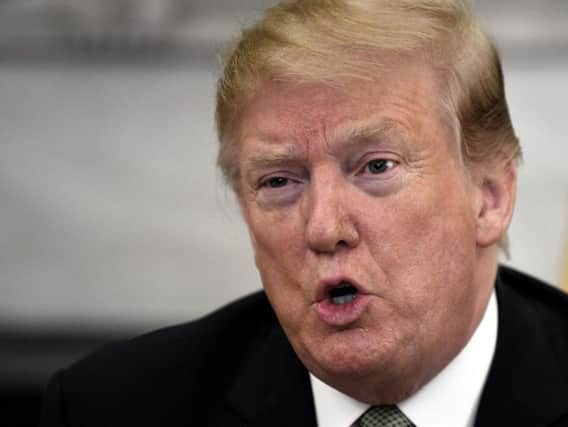Donald Trump has shattered European complacency on NATO, says George Robertson


Former Labour defence secretary, George Robertson, who led NATO for four years, has said that the US President's disparagement of the organisation should "remind other allies of both the value of NATO and their own responsibilities" to it.
Lord Robertson, who was NATO Secretary General from 1999 to 2003, said that "a complacency that America will always be there with its clout and resources" had held back investment from Canada and European members. He added: "Donald Trump has shattered that complacency and for that, if nothing else, we should be grateful".
Advertisement
Hide AdAdvertisement
Hide AdThe peer, who was awarded the US Presidential Medal of Freedom in 2003 by President George W Bush, made the controversial comments as he marked the 70th anniversary of the North Atlantic Treaty Organisation.
Writing in the Scottish Review, he said: "In the last few weeks we are told that the present occupant of the White House, in NATO's strongest ally, has been reported as questioning US membership of the alliance.
"Worrying as that undoubtedly is, it may have reminded other allies of both the value of NATO and their own responsibilities to 'bear the burden' of its means. Nothing underlines the importance of American leadership in the world than the thought of losing it.
"Burden sharing has long been a theme of American politicians, including the cheerleaders for the alliance – and with good reason. But a complacency that America will always be there with its clout and resources has held back the investment required for Europe's (and Canada's) contribution to the common effort. Donald Trump has shattered that complacency and for that, if for nothing else, we should be grateful."
Donald Trump has questioned the usefulness of the alliance and criticised Germany in particular, for not being on track to meet a NATO target for each country to spend two per cent of its GDP on defence.
Apparently agreeing with Mr Trump, Lord Robertson wrote: "The time has come to go beyond publishing national gross spending figures on defence. Too often, the attempt to meet the two per cent agreed target involves shady financial engineering. The composition has also to go public. What lasting value is two per cent if it is made up of pensions and equipment for the last but one war?
"Up to now we have been reluctant to name and shame on the real military figures. It was claimed that it might give our adversaries details they would exploit. In the era of mass surveyance and data collection, this is an outdated view. Publics have the right to know what is being spent, on what and to what end."
Lord Robertson's words come as current NATO Secretary General Jens Stoltenberg was due to meet the US President today. The White House visit comes before two days of talks in Washington among the 29 foreign ministers of the NATO with Russia expected to top the agenda.
Advertisement
Hide AdAdvertisement
Hide Ad"Relations with Russia matter," Lord Robertson said. "The NATO-Russia Council of which I was the first chairman should be an important venue for dialogue. It was created in a time of rare amity but was intended for tough times as well.
"The urgency of talking with the big Eastern neighbour is manifest. We should reinvigorate the council."
He also suggested that NATO needed to change to meet new cyber threats as well as physical military ones, but stressed that nuclear deterrents were as vital as ever. "In that collective deterrence which has kept the peace in the EuroAtlantic area for 70 years is the crucial nuclear element. The American, British and French nuclear forces along with the other weapons on European soil have been the backbone of a posture which has made conventional war unthinkable. They are as important today as they ever were."
He added: "Much more emphasis has to be put on intelligence and cyber defences. Quantifying spending on this crucial arm of defence needs to be a priority. We need to know what is being spent on this new and vital front line. A cyber attack on a nation or a city cannot be responded to with a main battle tank. And we have far too many of them and too little of the other."
"European contributions are starting to increase and the Wales Summit, by highlighting targets on readiness and equipment spending, has accelerated change. We need less talk now about 'European armies' and 'strategic autonomy'. These are empty buzz-words meaning little and we need more of an emphasis on ending duplication and inefficiency in defence budgets.